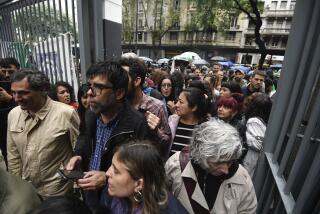Self-Employment May Be Answer to Cuba’s Problems : Economics: As factories shut down in recession, tens of thousands take out licenses to provide goods and services.
- Share via
HAVANA, Cuba — Workers here, no longer guaranteed a meal ticket for life in state industry, will have to look increasingly at areas such as self-employment if they want a job, says the country’s top trade unionist.
Pedro Ross, president of the Cuban Workers Union and a member of the ruling Communist Party’s Politburo, stressed in a recent interview that there was a need for a flexible labor market amid Cuba’s current economic reforms.
Ross, whose organization represents virtually all of the country’s 3.5 million workers, said some 140,000 people are either at home on 60% of their salaries because their factories are partially or completely paralyzed, or are in the process of being “relocated” to other jobs.
A total of some 500,000 people could end up being moved from their current jobs amid the country’s drive to cut state costs, including subsidies paid to loss-making industry, he said.
Cuba is facing the obvious headache of what to do with surplus workers as it tries to pull out of deep recession triggered by the collapse of communism in the former Soviet bloc.
Some independent economists have put the number of people who would be shunted out of their jobs in an efficient economy at 1 million or more. Some say this implies a need for more radical reform, including allowing small private businesses and not just self-employment.
Ross, trade union boss for the past five years, stressed that Cuba’s commitment to social justice meant that changes would be slow and nobody would be abandoned to their fate. “No worker is going to be left unprotected,” he said.
Cuba does not release figures for the number of people who are unemployed. Those still “belonging” to factories that are not operating or are only semi-functioning because of lack of input or energy shortages are not viewed as jobless.
One area that should rapidly become a bigger source of jobs is self-employment, Ross said.
Under a law passed in late 1993, some 160,000 people have obtained licenses to provide authorized goods and services in about 140 categories, ranging from selling homemade peanut candy to repairing bicycles.
“This could rise to half a million people,” Ross said. “More possibilities have to open up, and as fast as possible.”
But he admitted that the self-employed could not be “magicians” and needed support with supplies of raw materials to make their products.
Authorities have spoken for the past few months of the need to expand self-employment, but there has been no sign yet of concrete steps either to increase the range of permitted services or lift restrictions on who may be self-employed.
Ross, insisting that Cuba had been addressing the problem of inflated work forces for some years, noted that the country’s push for foreign investment had already meant trimming jobs.
“Nobody who wants to invest in our country wants to take on a work force that is more than is necessary,” he said.
But in the new joint ventures, Cuban labor law applied and the trade union had a say in working out the labor contract, Ross noted.
And overall, he was optimistic that foreign capital meant reviving the economy and creating new job opportunities.
In tourism, for example, foreign management has in some cases led to cuts of up to half the staff formerly employed at a hotel. But tourism generally was a growth industry and should be a major source of jobs in the future, Ross said.
Some 100,000 people are currently employed directly or indirectly in tourism, and this could grow by 20,000 to 30,000 annually over the next decade, he added.
Similarly, foreign investment in nickel mining in the east of the country would eventually lead to a demand for more workers, not a surplus.
Ross said that of the total work force, some 700,000 people are employed in the country’s extensive public health and education systems, where jobs are not under threat.
Another 2.2 million are employed in goods-producing sectors, including agriculture.
Farming was another area where workers are in demand, Ross said. Cuba has reversed a labor ratio of about 70 rural jobs to 30 urban jobs since its 1959 revolution.
More to Read
Sign up for Essential California
The most important California stories and recommendations in your inbox every morning.
You may occasionally receive promotional content from the Los Angeles Times.













